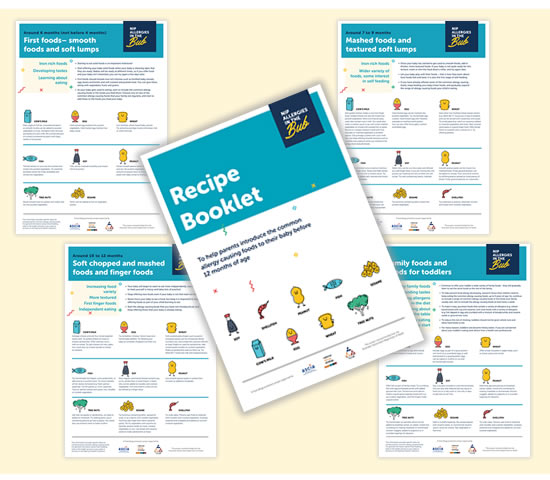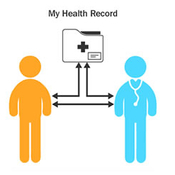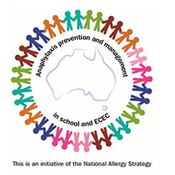July 2020
The countdown to the end of the financial year, was a particularly productive one for the National Allergy Strategy. We are continually developing resources for health professionals, people with allergic disease, their carers, and the food service sector. Read on to find out about our exciting new 250K animations showing ‘How allergies work’, new messaging to parents to keep the common allergens in their baby’s diet, and what we are doing to improve education about food allergen management in hospitals.
Food allergy prevention project (Nip allergies in the Bub)

- Building on the original message to introduce the common food allergens before a baby turns one, we now continue to emphasise the importance of keeping these foods in the baby’s diet at least twice a week once introduced.
- This messaging will be promoted through a social media campaign in August 2020 using a new 15 second video about feeding the common food allergens at least twice a week once introduced.
- New downloadable resources to support parents with the important messaging around continued feeding of the common food allergens once introduced include:
- NEW – food and recipe ideas for babies of different ages and stages of eating development to explain how to incorporate the common food allergens into first foods through to toddler and family meals.
- NEW – A new recipe booklet containing a range of recipes which include the common food allergens. There are a range of recipes for the different ages and stages of eating development that gives parents ideas and inspiration.

- A very successful Nip allergies in the Bub social media campaign was run through Mamamia advertising and podcasts during June 2020.
- FREE Nip allergies in the Bub bookmarks can be ordered by health professionals for patients from the Allergy & Anaphylaxis Australia website: https://allergyfacts.org.au/shop/nasr
To visit the Nip allergies in the Bub website, go to: www.preventallergies.org.au
250K youth project
- NEW – ‘How allergies work’ animations have been added to the 250K school aged teens and young adult websites. These short animations provide a simple explanation about how allergies are developed and also what happens in the body to cause the symptoms of an allergic reaction. Our very own Nyssa Booth, National Allergy Strategy Social Media and Communications Officer, provided the voiceover for these informative, easy to understand videos!

- As part of the 250K Peer Mentor Program, we held our first peer mentor training session via Zoom video conferencing. We look forward to further training sessions with our enthusiastic peer mentors over the next few months.
- The Connect 250K project allows young people to connect to share experiences through online chat forums. Our Zoom chats with young adults continue to be run every 3 weeks and our school aged teens chat forums and Zoom chats are undertaken every 4 weeks. In addition to this, we also conduct separate Zoom chats with our peer mentors.
- School aged teens and young adults want more videos! As well as the ‘How allergies work’ animations, we will have new eczema and allergic rhinitis animations coming soon.
- We continue to plan our next 250K youth camp which is intended to be held in Perth in January 2021. The aim of the 250K camps is to bring together teens living with severe allergy.
To visit the 250K website, go to: 250K.org.au

Food allergy management in food service project
- The All about Allergens in Hospitals online courses are well on their way to being developed as a free resource for kitchen and ward staff with an expected release date of late September 2020.
- A National Allergy Strategy Food Service Project Working Group has been working hard to develop four course versions that will be relevant to the different roles in hospitals and what they need to know about food allergen management.
- External stakeholders have been engaged in reviewing the course content.
The Food Allergy Aware resource hub provides links to information for consumers, health professionals, food service staff and staff working in schools and early childhood education and care. To access the National Allergy Strategy food allergy aware resource hub, go to: foodallergyaware.org.au

My Health Record allergy project
 We are pleased to advise that all project deliverables for 2019-20 were successfully completed.
We are pleased to advise that all project deliverables for 2019-20 were successfully completed.
- On 16 June 2020, a My Health Record Webinar specifically for clinical immunology/allergy specialists was co-presented by Dr Kathy Rainbird from the Australian Digital Health Agency and Dr William Smith (clinical immunology/allergy specialist). The Webinar was well attended and a recording of the webinar is available on the National Allergy Strategy website.
- A series of My Health Record fact sheets and user case scenarios have been developed to support clinical immunology/allergy specialists.
- We continue to progress work that will encourage clinical immunology/allergy specialists and consumers to utilise My Health Record and ensure that allergy and adverse reaction information is accurate and up to date.
- To access current resources or find out more about this project, go to:
nationalallergystrategy.org.au/projects/australian-digital-health-agency
Anaphylaxis prevention and management in school and Early Childhood Education and Care (ECEC) project
 The National Allergy Strategy is engaging with key stakeholders to develop national minimum standards for the prevention and management of anaphylaxis in schools and ECEC.
The National Allergy Strategy is engaging with key stakeholders to develop national minimum standards for the prevention and management of anaphylaxis in schools and ECEC.
- Phase One consultation was a face to face stakeholder meeting held in February 2020.
- The minimum standards have now been updated and we will move into Phase Two consultation which will involve a national survey of school and ECEC staff.
- The NAS is developing a food allergy oral immunotherapy guidance document for schools, boarding schools, camp providers and ECEC services in consultation with stakeholders.
- To find out more about this project, go to:
nationalallergystrategy.org.au/projects/schools-and-cec
Stay informed about the National Allergy Strategy
Follow us on Facebook, LinkedIn, Instagram and Twitter to stay informed or visit the National Allergy Strategy website: nationalallergystrategy.org.au

